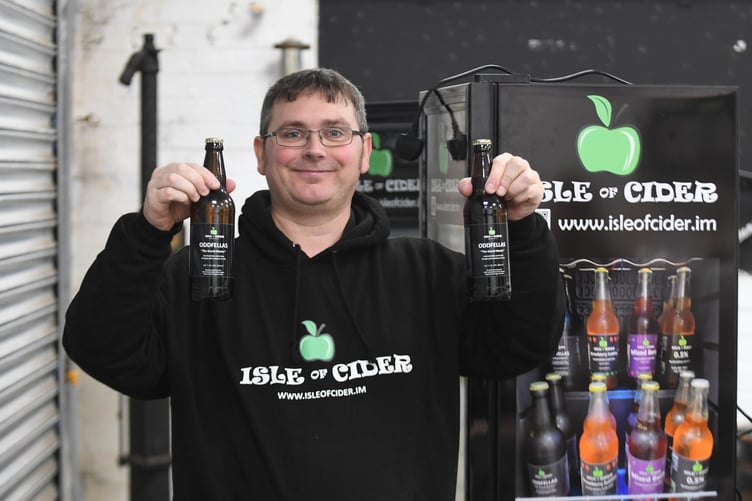Herefordshire craft cider bringing Manx history to life reads the label on the bottles of Isle of Cider’s Oddfellas cider.
There’s also a photo of James Rae Fielding, the great great great grandfather of Phil Jolley, who founded Isle of Cider three years ago.
And if you scan the QR code next to the photo you can watch a short film about Mr Fielding and his life on the North Quay in Douglas back in the 1800s. The name ‘Oddfellas’ comes from the fact that Mr Fielding was The Grand Master of the Manx Oddfellows Society in 1862.
When Phil came to live in the island, he had no idea that he had an illustrious Manx ancestor who would end up becoming such a big part of his company’s brand identity.
Phil came here originally to work for Okell’s Brewery and for him it was a natural progression to then go into the cider business.
He was brought up in cider country, on the Herefordshire/Worcestershire border, where his family lived in a 16th century black and white cottage with a cider mill in the barn.
He says: ‘It originally started out as me sourcing cider from small and medium sized producers in the UK, from around where I used to live, to bring it over here. It was about getting 100% juice cider – cider not [made] from a concentrate – to people in the Isle of Man.
‘Then I started to do my own brand, Isle of Cider: I work with a cider producer in Herefordshire who makes it for me and it’s all 100% juice. It get it shipped in and distribute it around the island.’
You may have noticed the distinctive Isle of Cider fridge installations, perched on vintage barrels, in some of the EVF garage forecourt shops around the island.
Phil says: ‘They are upcycled whiskey barrels from around the 1960s, which I bring in from across, clean them up and then clear coat them and put a nice lid on the top and that’s what the fridge is clamped on to. It’s something different and quirky and it stands out from the crowd.’
From his unit in the Riverside Industrial Estate, He also supplies Tynwald Mills Deli as well as pubs, bars and restaurants around the island with the four ciders in the Isle of Cider range: Oddfellas, which is a medium sparkling 5.2% cider; Strawberry Sublime, which is strawberry and lime flavoured and is their bestseller; Mixed Berry, and a low alcohol, 0.5% cider.
The Creek in Peel stocks a version of Oddfellas, which is completely still, supplied in recyclable plastic bags inside a box, which can be put on tap.
‘They do amazingly well with it, that’s on draught all the time in there,’ says Phil.
Cider has become increasingly popular in recent years. The UK drinks more cider than anywhere else in the world, with 57% of the apples grown there going towards cider production.
As we also have no shortage of apple trees in the island the obvious question to ask Phil is: why don’t you make cider on the island, from Manx-grown apples?
He says: ‘I am wholly aware that there are a lot of people that want cider to be made in the island.
‘At the moment the reason we get it all made across is because it makes more financial sense to do it there and [it offers us] growth – we can make somewhere in the region of three million litres a year and you’ve got access to all the apples you’ll ever need.
‘Here, right now in the Isle of Man, there’s lots of people with apple trees. You could get 40 tons of apples over here but they’re the wrong kind of apples. You can make cider out of them and you would make what we’d call an ‘Eastern’ type of cider [a cider which uses dessert and culinary apples developed historically for home consumption rather than apples developed historically for cider production].
‘It will make cider but it will taste different every time you make it and there’s no consistency. It also tends to be too dry.’
To provide a way forward for cider making in the island Phil has come up with a new idea.
He explains: ‘I’ve found an apple tree grower in the UK who is supplying me with sapling cider apple trees. So I’ve started the Isle of Cider Apple Growers’ Cooperative and we’ve got about 20 people signed up so far, and growing.
‘The public can buy a sapling from us, grow it in their garden and then, in two to four years’ time when it fruits, Isle of Cider will buy back the apples from them at the current market rate per kilo and then we’ll juice it and make some cider out of it.
‘I’ve got a professional cider producer in the UK who’s going to be working with us on that side of things and I also have a professional gardener who knows about trees who we’ll be working with, to tell us where to plant and what to plant.
‘We will always still do the stuff made in Herefordshire, just because of the volumes, but as a side project we will do short runs of proper, Manx made cider with real cider apples.
‘It gets the general public involved with the brand and it’s just a nice thing to do.’
So how did Phil discover that he has Manx heritage?
He says: ‘When I moved over here I did not know there was any family history to the Isle of Man. And then my uncle who is retired biochemist who does some family genealogy in his spare time said: “Oh did you know you’ve got a relative who lived there?” and never said anything more about it. Then it was all just very serendipitous really.
‘ One day I asked him what the story was about and he told me and I went and looked it up and I thought: “Wow – that’s quite cool”.
‘James Rae Fielding is my great, great, great grandfather on my dad’s side. His story centres around the North Quay area where he was very much to do with the original St Matthew’s Church which is now the footprint of the Manx Legion Club.
‘The plot of land where the new St Matthew’s Church is built now, on Ridgeway Street, he had a barber’s shop there and, filling in the gaps from the research and judging from all the maps, that was his land which he gave to the church to then have St Matthew’s built.
‘He was also one of the founders of the hospital committee which then became Noble’s Hospital.’
It was quite a discovery and too good not to use to add a little history and tradition to what is, after all, a very traditional drink. And as the festive season gets into full swing, many bottles of Oddfellas will no doubt be drunk and the memory of James Rae Fielding will live on.




.jpeg?width=209&height=140&crop=209:145,smart&quality=75)
Comments
This article has no comments yet. Be the first to leave a comment.